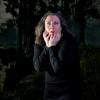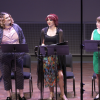
When Igor Stravinsky is the easier composer on a double bill, it’s an exciting night at the opera. Just by including Arnold Schoenberg’s Erwartung (Expectation) in its three-program festival at the Oakland Scottish Rite Center, West Edge Opera took a musical risk — one that paid off. It was the anodyne staging that missed the mark.
Stravinsky’s The Nightingale, nominally set in China, has its fair share of pentatonic music, albeit bitonal and rhythmically displaced. But in the text, roses and diamonds appear where you might expect peonies and jade, and there’s only a cursory reference to bamboo. If anything, the opera is orientalist by way of impressionism. (It’s often recounted that Claude Debussy heard Javanese and Vietnamese music at the 1889 Paris Exposition, but Maurice Ravel, whose music this work more resembles, was also there.) Even the augmented sixth chords are French.

Staging the story, it does make sense to de-emphasize the Japanese ethnicity of the envoys, who gift the Emperor an unconvincing mechanical nightingale and are usually portrayed as drones. On Saturday, the cohort’s magenta-suited mugging paired unexpectedly but delightfully with the parallel voicing of Stravinsky’s score. (The Emperor is referred to as cruel, but his part is too small, though beautifully sung here by bass Patrick Scully, to tell.)
Little else about this opera is objectionable by contemporary standards, yet West Edge’s production, directed by Giselle Ty, seemed ill at ease. The Hans Christian Andersen story that served as Stravinsky’s source material tells of how the Emperor gains compassion — or at least is knocked down a peg — through music. Such a thin fairy tale could be set anywhere, but should it be?
Take the Nightingale’s entrance music, some of the most gorgeous I’ve heard in opera (rivaled by the nightingale of Die Vögel, Walter Braunfels’s criminally overlooked bird opera composed around the same time). Amid silvery chirps (luminously played by Tod Brody on piccolo), triads descend from on high, reaching a luxurious G-flat major chord. The bird has landed.
But in Ty’s inverted staging, everyone in the court is a bird, so the Nightingale isn’t special. She isn’t even a bird so much as a coveralled custodian who skulks onstage to help with the beach cleanup. It’s tongue in cheek maybe, but it also looks like the detritus from an elementary school play about recycling.
This Nightingale deserves better. Soprano Helen Zhibing Huang has a magnificent, uncommonly powerful coloratura; she tossed off the most florid decorations with the lightest touch. Bass Chung-Wai Soong wasn’t strong enough in his low register to play the Chamberlain with convincing rigidity. As the Cook, mezzo-soprano Kristen Choi was sonorous and ebullient; you always rooted for her. And the orchestra, conducted by Jonathan Khuner for both operas, sounded like a million bucks.

The ensemble was particularly impressive in Schoenberg’s Erwartung, a dense monodrama with a difficult reputation. It was written in 1909 but premiered 15 years later; it’s easy to imagine the original musicians were continuously preparing that whole time.
The premise: A woman, alone (well, she should be) in a forest at night, searches for her lover, only to find him dead. The plot is her psyche. Fittingly, the opera sounds through-composed, though plenty of scholarly articles propose that there’s an underlying structure.
Consider certain satisfying musical moments, like when staccato plops evoke the lover’s dripping blood. On the other hand, there are five overlapping major and minor seconds under the phrase “The night is so warm.” Yet Schoenberg orchestrates this cluster in such a way that you do hear the underlying triad. Conventionally cadential in its second-inversion voicing, it loudly anticipates the horrors to come.

Through the voyeurism of opera, these horrors are divine. Erwartung sounds like Schoenberg’s love letter to the 19th century, with expressive gestures stretched to comic heights. “I love you so” is set with a catapulting major tenth that swoons a diminished octave down, as if on a fainting couch.
The dissonance expands until it consumes the consonance, which it was only ever supposed to bring into relief. Schoenberg’s 12-tone music has been called unapproachable, but the early tone-row pieces to come, like the Variations for Orchestra, are much more orderly than this maximalist swan song.
Paradoxically, such freewheeling writing demands exact tuning. It’s not enough just to hit the notes (itself such a feat that no recording of Erwartung seems to be 100 percent accurate); they need to be inflected maximally to show what they are. Soprano Mary Evelyn Hangley, in her West Edge debut, did it right. Her singing was incisive, emotive, and nuanced; she could have carried the show herself.
Alas, when she yelled for help, it came. This half was set — too conclusively — in a hospital, whose 24-hour shift workers coddled and danced away the drama. The woman may be crazy, but ensconced, she’ll basically be OK. In her director’s note, Ty writes that “prioritizing stimulation over investigation” seems a “futile and unsatisfying pursuit.” But what, if not unsatisfying stimulation, is this constant clutter? It’s pandering. If we need this much spectacle to sit through Erwartung, we don’t deserve it.
West Edge Opera’s double bill of The Nightingale and Erwartung plays two more performances, Aug. 4 and 6.




